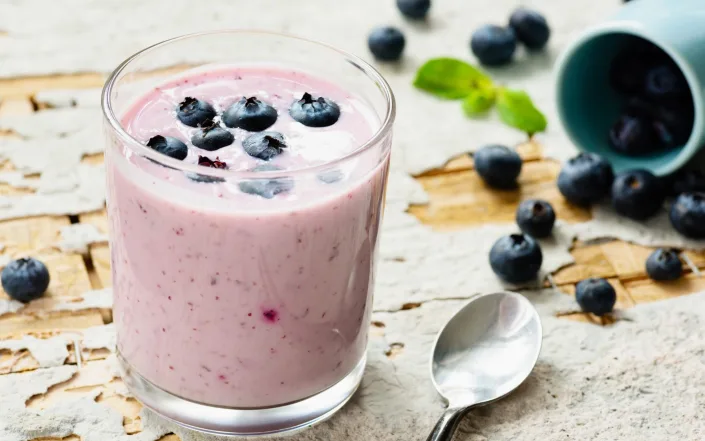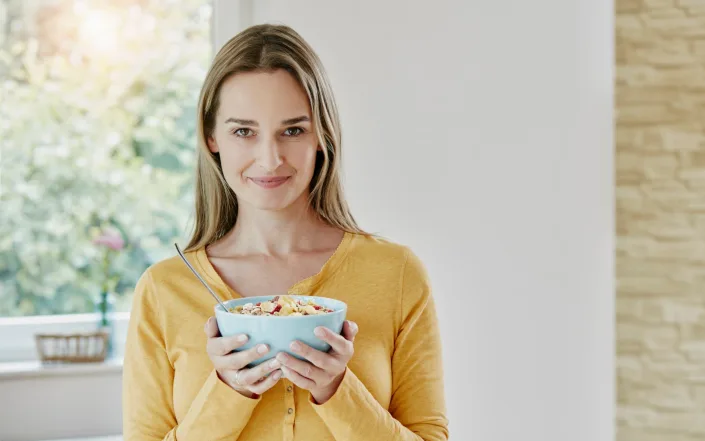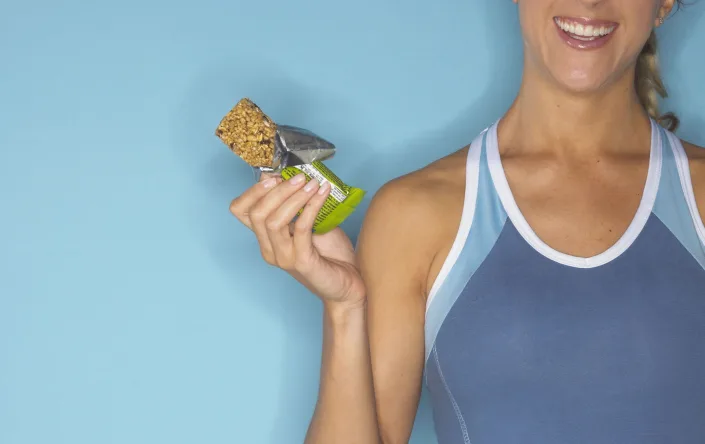 “Low fat”, “low sugar”, “all natural” and other marketing terms that give foods a “health halo” can often disguise unhealthy ingredients, additives and ultra-processing methods that don’t do us any good.
“Low fat”, “low sugar”, “all natural” and other marketing terms that give foods a “health halo” can often disguise unhealthy ingredients, additives and ultra-processing methods that don’t do us any good.
Whether you’re innocently dousing your salad in sugar-laden dressing, mainlining gut-curdling diet drinks or eating what amounts to a crumbled up flapjack for breakfast, there are plenty of ways health food fakes can creep into your otherwise healthy diet, upsetting the whole apple cart.
So, what’s the truth about these so-called healthy foods and drinks that you really could do without – and what could you eat instead?
Diet drinks A tax on sugary drinks has seen manufacturers replace some or all of the sugar in their products with artificial sweeteners. But a recent Israeli study added to growing evidence that these sweeteners are not completely innocuous.
Researchers found some sweeteners used in soft drinks and food may alter our gut microbes and increase the risk of diabetes. Other studies suggest a link between sweeteners and weight gain, and disturbed blood sugar levels.
Dr Duane Mellor, registered dietitian and senior teaching fellow at Aston Medical School, Aston University, says we should only consume artificially sweetened drinks occasionally as a “stepping stone” to reducing sugar.
“They’re not health products,” he says. “They’re highly acidic, which is bad for the teeth, and some contain lots of caffeine, which can disrupt your sleep.”
Healthy alternative: Sparkling water.
Fruit juice and smoothies
 Fruit juice can be healthy but only up to a point: more than the recommended 150ml/day and the sugar content outweighs the nutritional benefits. Fruit juice counts as a “free” sugar, which most of us need to cut back on.
Fruit juice can be healthy but only up to a point: more than the recommended 150ml/day and the sugar content outweighs the nutritional benefits. Fruit juice counts as a “free” sugar, which most of us need to cut back on.
“The issue with fruit juice is that people don’t just stick to 150ml,” says Dr Kathy Redfern, lecturer in human nutrition at Plymouth University. “Orange juice, for example, is a good source of vitamin C, but you’re missing out on the fibre and other micronutrients in the whole fruit.”
Smoothies are a hugely popular way of eating lots of fruit and veg in one hit, but they’re not necessarily healthy either. Shop-bought smoothies can contain fruit juice concentrate or puree, which cause blood sugar spikes. Often, nutrients and fibre are missing because they’re not made with the whole fruit, and can be highly calorific.
However, Dr Redfern says research from Plymouth University suggests smoothies made with fruit with seeds – kiwi fruit, passionfruit and raspberries – might not cause spikes in blood sugar. Research is ongoing, but one theory is that the seeds slow sugar absorption in the gut.
Healthy alternative: Fruit juice diluted with water; smoothies made with vegetables as well as fruit
Low fat yogurt and milk Low or zero fat yogurts, and those promoted as “no added sugar”, aren’t the healthiest choice, according to Dr Redfern.
Flavoured yogurts that are low or zero fat often contain fruit juice concentrates and/or purees – “free sugars” – along with other additives to make them palatable. And no-added sugar yogurts contain artificial sweeteners. “And I think the jury’s still out on those,” Dr Redfern says.
“I always choose the full-fat yogurt varieties because they keep you fuller for longer and are usually higher in protein,” she says. Although we’re advised to limit saturated fats, studies suggest those found in dairy might protect our hearts and confer other health benefits.
Healthy alternative: Full fat natural or Greek yogurt with chopped fruit.
Breakfast cereals
 If you reach for granola in the morning because of the healthy nuts and seeds, it’s worth thinking again. “Granola is basically a broken-up flapjack, which is a very high energy [calorie] food,” says Dr Mellor. The healthy ingredients are bound together with sugary syrups/ honey/ fruit juice concentrates and fats. If fruit juice concentrate, puree, honey, syrups or anything ending in -ose appear in the top three ingredients on the list, you know it’s sugar-laden.
If you reach for granola in the morning because of the healthy nuts and seeds, it’s worth thinking again. “Granola is basically a broken-up flapjack, which is a very high energy [calorie] food,” says Dr Mellor. The healthy ingredients are bound together with sugary syrups/ honey/ fruit juice concentrates and fats. If fruit juice concentrate, puree, honey, syrups or anything ending in -ose appear in the top three ingredients on the list, you know it’s sugar-laden.
Breakfast cereals proclaiming the presence of calcium and fibre, or added iron, vitamin D and folic acid are no guarantee they’re good for us. “These things don’t compensate for the really high sugar content of some of them,” says Dr Rana Conway, a registered nutritionist and member of the Obesity Policy Research Unit at University College London.
Porridge is a widely recognised healthy breakfast choice, but beware the instant sweetened kind. “Instant oats are ground up so they’re rapidly absorbed and often have syrups added, so blood sugar levels can just shoot up,” Dr Conway says.
Healthy alternative: Porridge made with large oats – the larger the flakes the longer they take to digest and the better they are for you – cooked with water/milk and fruit to sweeten.
Salads Dousing your salad with dressing can undo the benefits, according to Diabetes UK, which has analysed popular bottled dressings. Many are sweetened with sugar, molasses or fruit concentrates and loaded with salt and saturated fat. Check the traffic-light rating, the label marked with red, amber and green colour coding that tells you at a glance if the food has high, medium or low amounts of saturated fat, sugars and salt. Also check whether sugars are high on the ingredients list.
Saturated fat is found in dressing ingredients like cream, cheese and egg yolk, as well as the oil, so use in moderation. Caesar salad, for example – a combination of lettuce, chicken and croutons – can be a fatty meal if you drown it in dressing, which traditionally contains parmesan cheese, egg yolks and oil. “If you stick to the suggested tablespoon serving, dressings may not cause too much of a problem, but most of us will consume more than this,” the Diabetes UK website states.
Healthy alternative: Home-made dressings and vinaigrettes using olive oil.
Protein bars
 Snack bars marketed as “high protein” are meant to persuade us they’re healthy foods but, like granola, they’re often not what they seem. “Nobody needs to supplement their protein with these bars, because most of us get more than enough in our diet,“ Dr Redfern says. “They can be a convenient snack, but people need to remember they can be high in sugar and fat.”
Snack bars marketed as “high protein” are meant to persuade us they’re healthy foods but, like granola, they’re often not what they seem. “Nobody needs to supplement their protein with these bars, because most of us get more than enough in our diet,“ Dr Redfern says. “They can be a convenient snack, but people need to remember they can be high in sugar and fat.”
Visit food paper bag homepage for more details.
Healthy alternative: A handful of nuts and dried fruit; sliced apple with peanut butter.
Mock meat Can plant-based meat substitutes such as mock meat burgers and sausages made from ultra-processed soy products be part of a healthy diet? A report in the Journal of the American Medical Association by Dr Frank Hu from Harvard School of Public Health concluded the answer was “far from clear”.
The health benefits of fruits, vegetables, wholegrains and nuts – healthy fare for vegans and vegetarians – didn’t necessarily apply to meat alternatives made with highly processed plants. “Food processing can lead to the loss of some nutrients and phytochemicals naturally present in minimally processed plant foods,” says Dr Hu. He added that processing made these products “highly palatable” which could cause some people to eat more than the recommended portions.
Dr Redfern agrees that mock meat products like burgers and sausages haven’t been around for long enough to know how they impact our health. “I wouldn’t recommend consumers seeing these alternatives as ‘health foods’, but there doesn’t seem to be any evidence at present to suggest they can’t be used as a substitute for processed meats in moderation,” she says. “But remember that the best sources of plant-based protein are unprocessed beans, legumes, grains, pulses and nuts”.
Comments
No comments yet. Be the first to react!